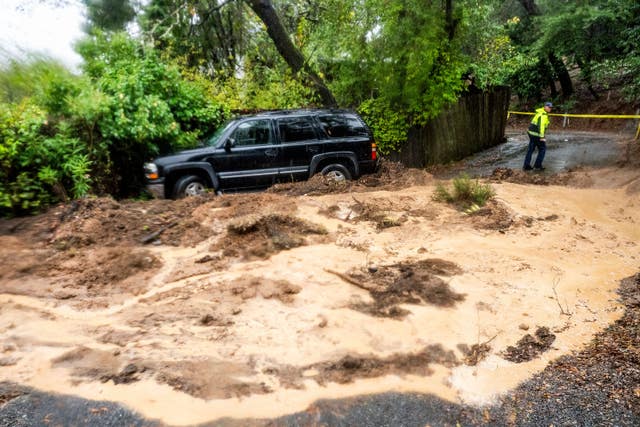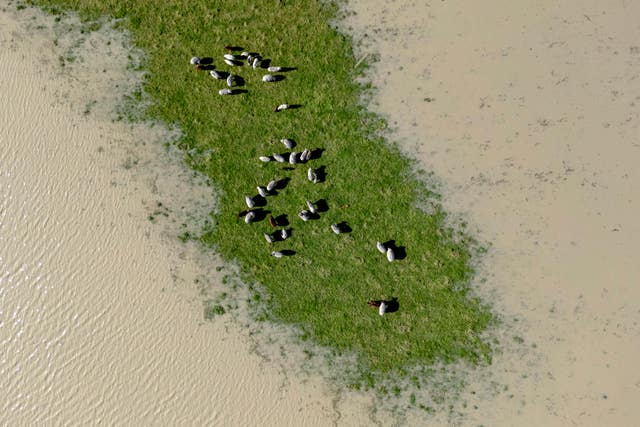
California has been hit by record levels of rainfall, which has caused small landslides and flooding in the US state.
The storm on the west coast of America arrived earlier this week, killing two people and cutting of power to hundreds of thousands, mostly in the Seattle area, before its strong winds moved through northern California.
Santa Rosa, California, saw its wettest three-day period on record with about 12.5 inches of rain falling by Friday evening, according to the National Weather Service in the Bay Area.
Flooding closed part of the Pacific Coast Highway in Mendocino County and there was no estimate for when it would reopen, according to the California Department of Transportation.

Meanwhile, on the east coast, another storm brought much-needed rain to New York and New Jersey, where rare wildfires have raged in recent weeks, and heavy snow to north-eastern Pennsylvania. Parts of West Virginia were under a blizzard warning throughout Saturday morning, with snow and high winds making travel treacherous.
As residents in the Seattle area headed into the weekend, more than 112,000 people were still without power from this season’s strongest atmospheric river – a long plume of moisture that forms over an ocean and flows through the sky over land. Crews worked to clear streets of downed lines, branches and other debris, while cities opened warming centres so people heading into their fourth day without power could get warm food and plug in their mobile phones and other devices.
Gale warnings were issued off Washington, Oregon and California, and high wind warnings were in effect across parts of Northern California and Oregon. There were winter storm warnings for parts of the California Cascades and the Sierra Nevada.
Forecasters predicted that both coasts would begin to see a reprieve from the storms as the system in the north east moves into eastern Canada and the one in the west heads south.
By Friday night, some relief was already being seen in California, where the sheriff’s office in Humboldt County downgraded evacuation orders to warnings for people near the Eel River after forecasters said the waterway would see moderate but not major flooding.

The system roared ashore on the west coast on Tuesday as a “bomb cyclone”, which occurs when a cyclone intensifies rapidly. It unleashed fierce winds that toppled trees onto roads, vehicles and homes.
Debra Campbell said she was sitting in the dark with a torch that night, unable to sleep as strong winds battered her house in Crescent City, California. A 150-foot tree came crashing down on her home and car.
“It was just so incredibly frightening,” Ms Campbell said. “Once I realised it wasn’t going to come through the ceiling where I was at, I was able to grab my car keys and my purse. … And I open the front door and it’s just solid tree.”
In the north east, which has been hit by drought, more than two inches of rain was expected by Saturday morning north of New York City, with snow mixed in at higher elevations.
Despite the mess, the precipitation was expected to help ease drought conditions in a state that has seen an exceptionally dry autumn.
“It’s not going to be a drought buster, but it’s definitely going to help when all this melts,” said Bryan Greenblatt, a National Weather Service meteorologist in Binghamton, New York.
Heavy snow fell in north-eastern Pennsylvania, including the Pocono Mountains, prompting a raft of school closures. Higher elevations reported up to 17 inches, with lesser accumulations in valley cities like Scranton and Wilkes-Barre. More than 85,000 customers in 10 counties lost power, and the state transportation department imposed speed restrictions on some roads.


Why are you making commenting on The National only available to subscribers?
We know there are thousands of National readers who want to debate, argue and go back and forth in the comments section of our stories. We’ve got the most informed readers in Scotland, asking each other the big questions about the future of our country.
Unfortunately, though, these important debates are being spoiled by a vocal minority of trolls who aren’t really interested in the issues, try to derail the conversations, register under fake names, and post vile abuse.
So that’s why we’ve decided to make the ability to comment only available to our paying subscribers. That way, all the trolls who post abuse on our website will have to pay if they want to join the debate – and risk a permanent ban from the account that they subscribe with.
The conversation will go back to what it should be about – people who care passionately about the issues, but disagree constructively on what we should do about them. Let’s get that debate started!
Callum Baird, Editor of The National
Comments: Our rules
We want our comments to be a lively and valuable part of our community - a place where readers can debate and engage with the most important local issues. The ability to comment on our stories is a privilege, not a right, however, and that privilege may be withdrawn if it is abused or misused.
Please report any comments that break our rules.
Read the rules here